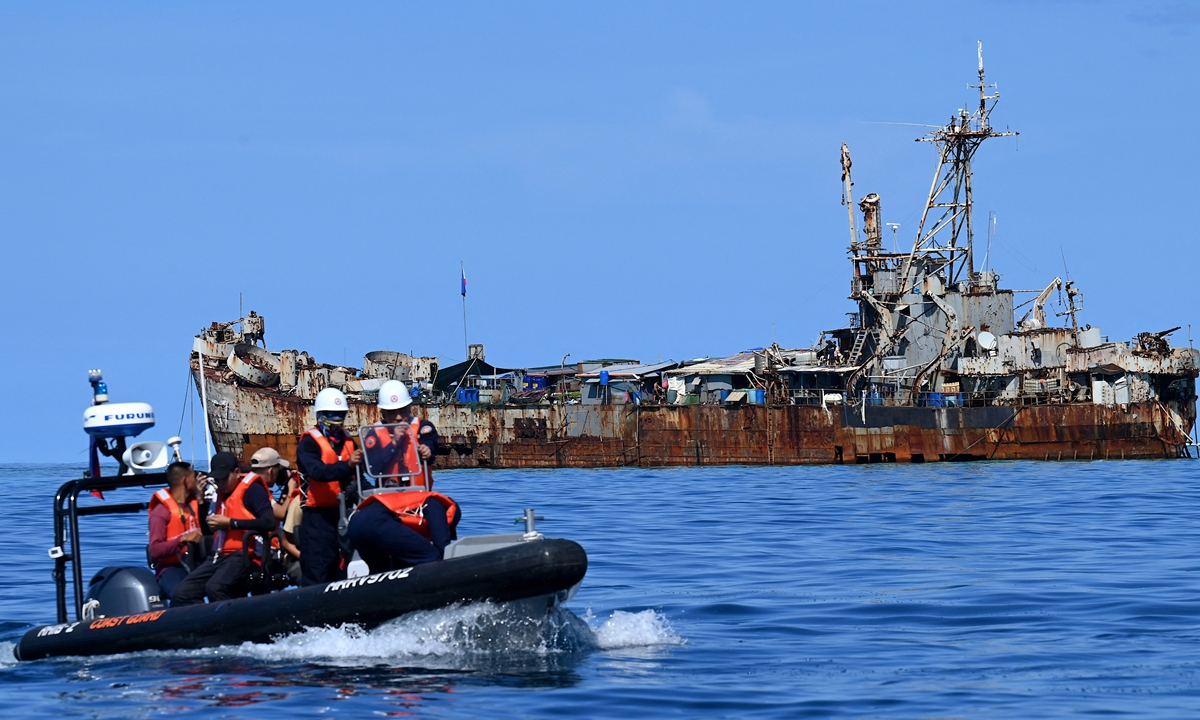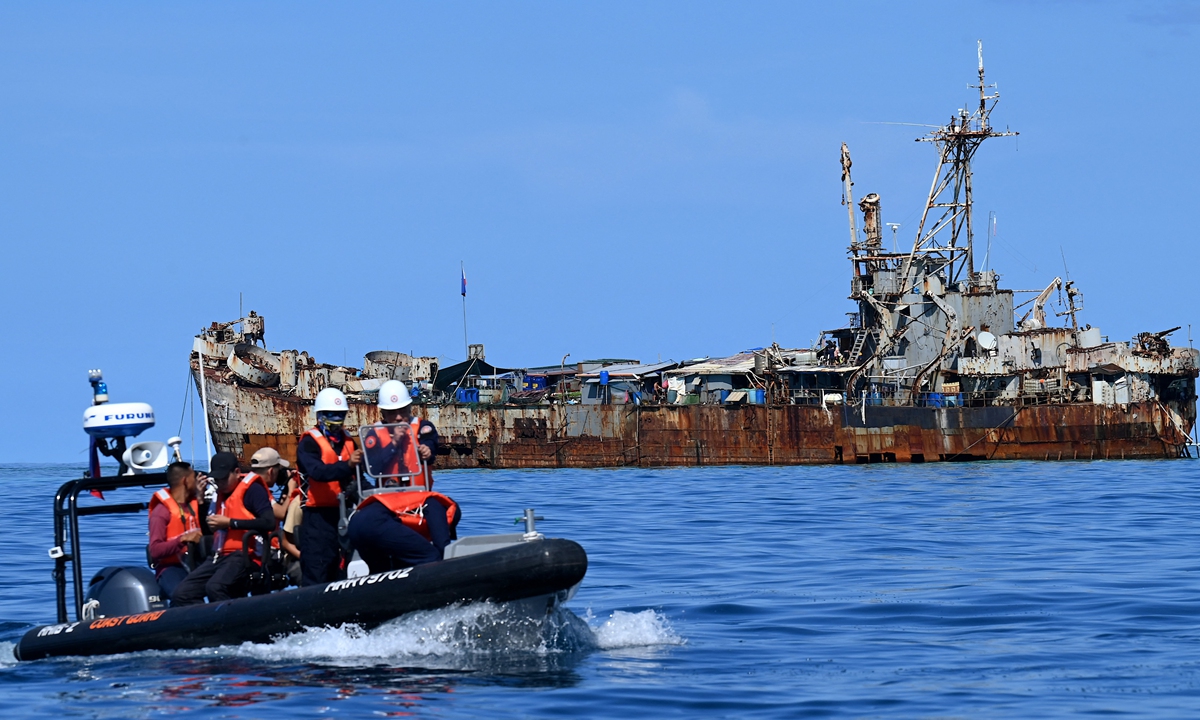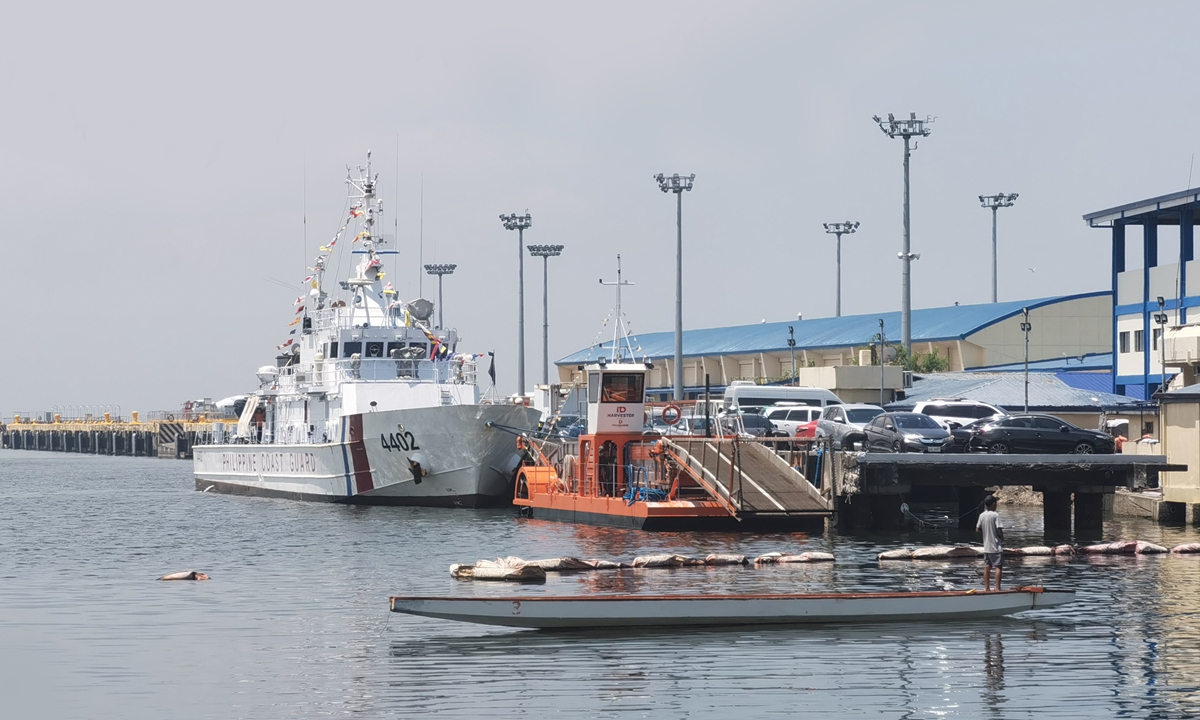Editor’s Note:
The Philippines has escalated its battle against Beijing on the South China Sea issue by pushing fishermen to the frontline, collaborating with Western journalists to spread biased narratives, and conspiring with the US and Japan to contain China.
Global Times reporters recently visited the Philippines to investigate the truth behind these provocations, engaging in conversations with local fishermen, ordinary citizens, politicians, and scholars.
This is the first installment of the series, which sheds light on how Filipino fishermen have refused to be used as pawns by the current administration in the conflict.
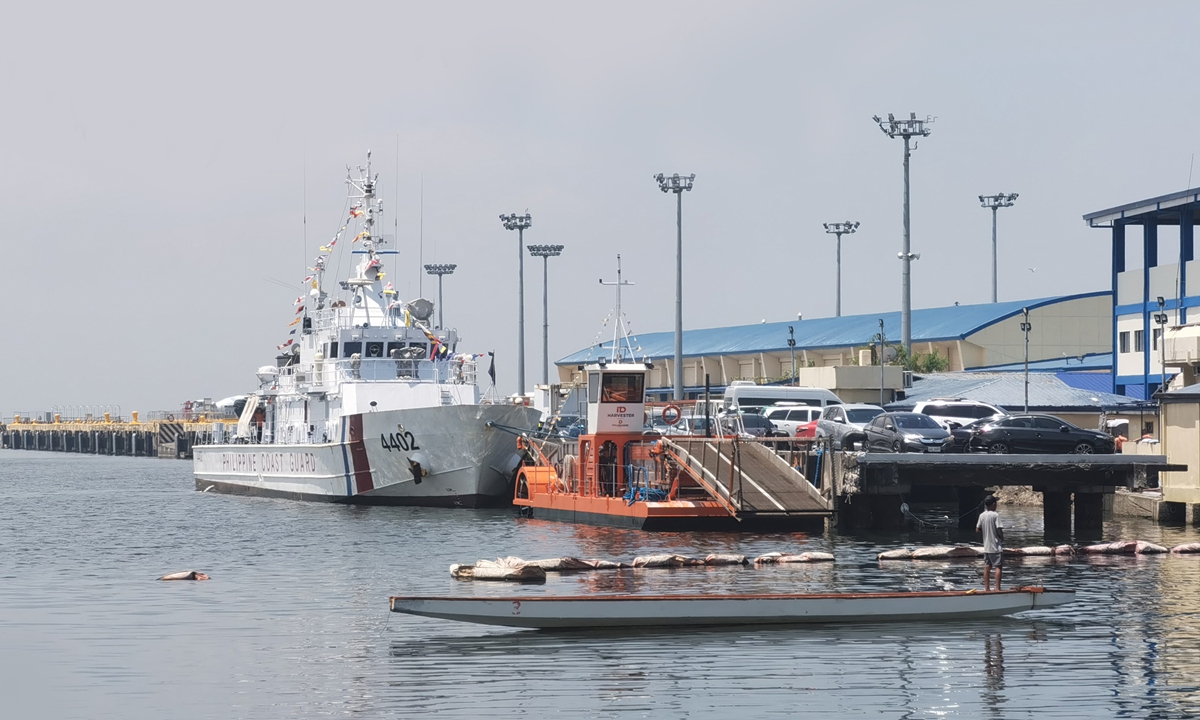
The Philippine Coast Guard (PCG) vessel MRRV-4402, a boat that has repeatedly illegally entered China’s Huangyan Dao and Ren’ai Jiao, is docked at PCG’s headquarters in Manila on March 27, 2024. Photo: Hu Yuwei/Global Times
The Philippine government seeks to encourage its fisherfolk to be the vanguard of the South China Sea dispute through government-organized group fishing and its premeditated “militia” plan. However, the Global Times’ recent in-person visit to the Philippines and conversations with local fishermen revealed that Filipino fishermen show no intention of participating in any “militia” plan or being drawn into the current administration’s strategy against China.
In fact, fishermen in the Philippines are seeking more peace and cooperation, as the current tensions have disrupted their fishing activities and diminished their income. Their practical mindset contrasts sharply with the sensational narratives created by local media outlets and some politicians with ulterior motives.
Unlike the image of Filipino fishermen that the Philippine government intends to portray – a group with a strong desire for combat or aggression in territorial disputes – the fishermen in Masinloc, a Philippine town closest in proximity to China’s Huangyan Dao (also known as Huangyan Island, or Scarborough Shoal in the Philippines) in the South China Sea, showed no signs of fear, distrust, confrontation, or hostility when they learned that they were talking to reporters from China.
Instead, the fishermen warmly expressed a clear desire for friendship and peace. Some curious and friendly fishermen approached to the reporters and actively shared their fishing experiences in the waters of Huangyan Dao in front of the camera. In conversations with Global Times reporters, many fishermen repeatedly stressed, “We are not enemies.”
Since 2023, the Philippines has been sending government vessels and fishing ships to provoke disputes in the South China Sea, particularly near China’s Huangyan Dao, under the guise of “ensuring the security of Filipino fishermen.” Interestingly, fishing activities have not been disrupted since 2016 when China offered a temporary dispensation for Philippine fishermen, a situation that has become problematic due to the current administration’ decision to “protect them.”
So, who benefits from turning fishermen into pawns in the South China Sea battlefield? This investigative report provides the answer.
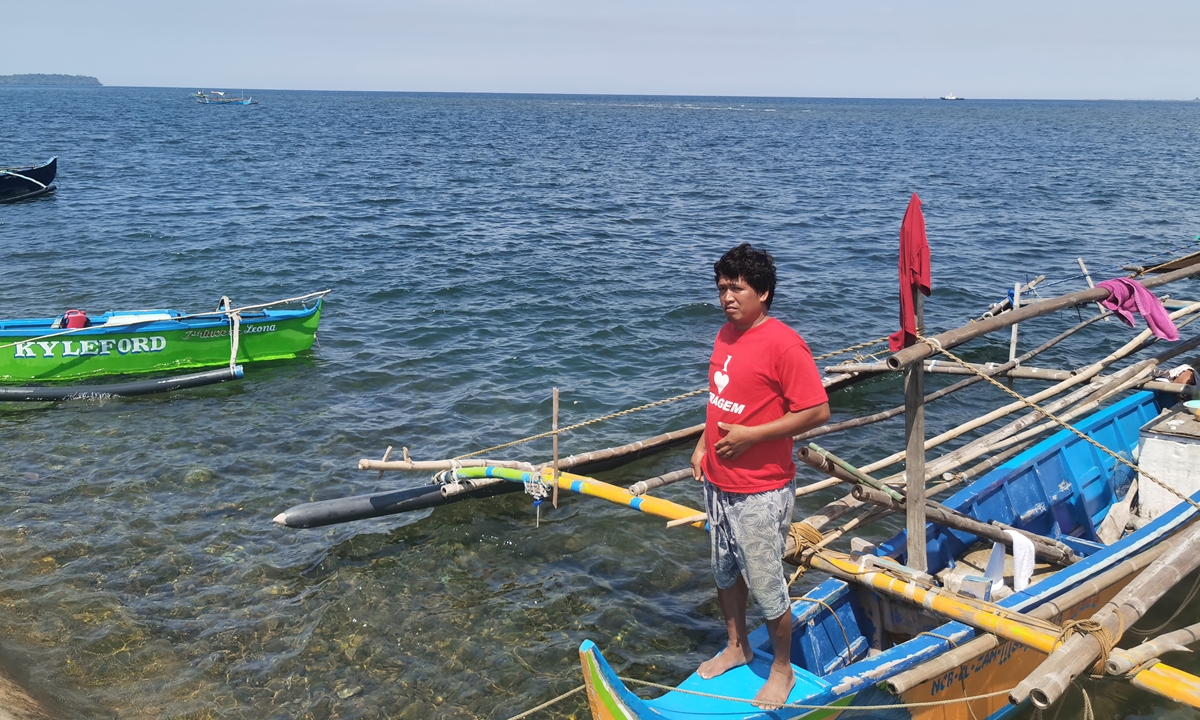
A Filipino fisherman stands on a wooden boat at Masinloc port, Philippines. Photo: Hu Yuwei/GT
Refused to be ‘kidnapped’
The small town of Masinloc in the northern Philippines, about 125 nautical miles from China’s Huangyan Dao, is a peaceful seaside fishing port. Local fishermen have been fishing here for generations. The raging storm in the sea has typically been the only thing for them to confront, but now they have been presented with a new “opponent” – China. Searching the term Masinloc on YouTube and social media reveals videos of confrontations between local fishermen and the China Coast Guard, as opposed to the island’s picturesque beauty previously.
In the narratives of some Western and Philippine media outlets, the fishermen of Masinloc seem to have become one of the most radical groups in the Philippines in confronting China. But the Global Times’ field visit reveals a different reality.
Local fishermen who spoke with the Global Times said that a large amount of seafood on their shelves is caught in the South China Sea and their normal fishing activities in the area are still ongoing as normal.Jessie Caasi, a fisherwoman, told the Global Times that many fisherfolk like her typically make regular trips – about three days a week – to Huangyan Dao to fish. In recent months, they have mainly used two government-provided fishing boats, with each boat carrying around 15 people, making a total of about 30 people per trip.
Jorin Egana, a 29-year-old fish vendor, also confirmed the offer. He told the Global Times that these two government-provided boats have been made available since January, equipped with basic supplies such as water, food, and medicine. Prior to this, most fishermen used to rent boats for individual fishing trips.
The official assistance is seen as a sign of the government’s deeper involvement in the increasingly intense situation, they believed.
Caasi said she regrets that they are currently unable to enter the main fishing areas of Huangyan Dao due to the escalating conflict between the two governments. She stressed that there were no restrictions at all before the current administration took office.
“At that time, the China Coast Guard was friendly, and Chinese and Filipino fishermen could fish together there. We greeted each other as friends and got along well. But in recent days, our news reports kept saying that China wanted to occupy the Scarborough Shoal (Huangyan Dao), and the government began warning us to be careful when fishing there,” she said.
A previous piece by the Philippine media outlet the Inquirer cited Wilson Almadin, a 41-year-old Philippine fisherman who encountered the China Coast Guard at Huangyan Dao in November 2016, saying that “China Coast Guard vessels approached the boats of our fellow fishermen but only to share their food, liquor, and cigarettes.”
However, that is a bygone era for fishermen like Caasi today.
Although China neither accepts nor recognizes the so-called South China Sea Arbitration, in 2016, the country gave a special dispensation to Philippine fishermen to maintain their small-scale artisanal fishing activities around Huangyan Dao under humanitarian considerations.
From 2016 to 2023, China has stuck to its commitment. Despite the territorial and maritime disputes between the two sides, the livelihood of the fisherfolk has never been affected, which, as experts have noted, represents China’s goodwill in maintaining the peace and stability of the region.
However, the status quo changed since the Philippines began to send government vessels to the territorial sea of Huangyan Dao in the second half of 2023. In this case, China had to respond and repel the government vessels in accordance with the law.
In 2024, the Philippines started initiating more provocations. The Philippine fishery vessel group was reportedly accompanied by the Ship 3002 which belongs to the Philippines’ Bureau of Fisheries and Aquatic Resources when they trespassed into the waters off Huangyan Dao.
A source close to the matter told the Global Times that the Philippine official ship typically acts as a mother ship while at sea, not only providing fuel, fresh water, and food supplies to Philippine fishing boats, but also serving as a commander to direct different batches of fishing boats to illegally enter disputed waters.
Additionally, the Philippines has openly planned to deploy its own maritime militia to “defend its sovereignty” amid a raging territorial row with China.
“We want our fisherfolk to become reservists and teach them how to help in defending the country,” Gen. Romeo Brawner Jr, the Filipino armed forces chief, said in a statement in August 2023.
On February 23, the Philippines’ Bureau of Fisheries and Aquatic Resources (BFAR) publicly acknowledged that “it would also continue to carry out its duty of distributing fuel subsidies to the Filipino fishing boats that are present in the area to support their prolonged fishing activities.”
However, the fishermen interviewed by the Global Times said that they have not received any subsidies from the government specifically to support them in fishing around Huangyan Dao.
They emphasized that they will not participate in the government’s plan to turn fishermen into militia, noting that it is “too dangerous.”
“The Scarborough Shoal (Huangyan Dao) is too far away. I would rather stay in nearby waters to fish and earn less money. I don’t know why the Philippine military is doing this [militia plan]. I feel like very few people would be willing to cooperate with this plan,” the 29-year-old fisherman Jorin Egana told the Global Times.
“I don’t consider those kinds of unilateral actions from our government to be beneficial to the peaceful settlement of disputes. If you increase maritime militias in the South China Sea, you are in fact increasing the chances of violence. Let the fisherman be fishermen,” Rommel Banlaoi, Chairman of the Philippine Institute for Peace, Violence, and Terrorism Research, told the Global Times in Manila.
Opposing voices are already growing in the Philippine fishery circle. In August 2023, a Philippine fisher group on the Philippines’ illegally occupied Zhongye Dao (also known as Zhongye Island) turned down the militia plan by the government, local media source Philstar reported.
The group’s president Larry Hugo said that it would be “difficult” for them to undergo military training and that he would prefer not to carry firearms.
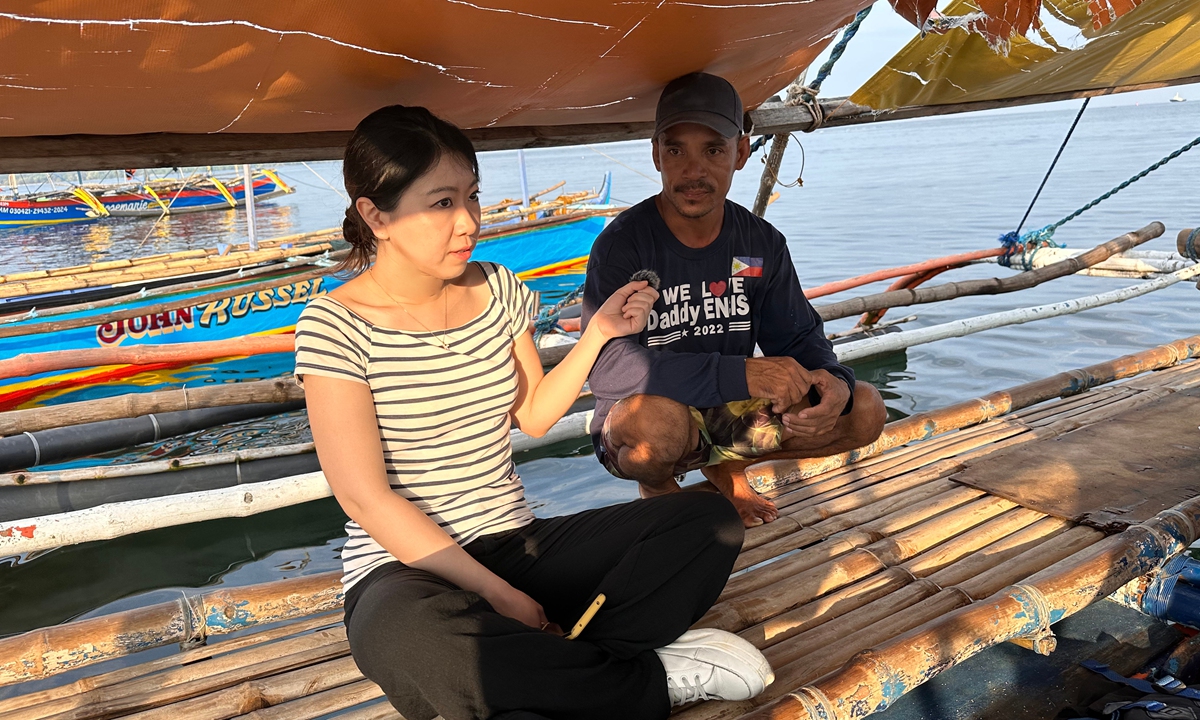
A Global Times reporter talks to a fisherman at a port in Masinloc, a Philippine town close to China’s Huangyan Dao on March 29, 2024. Photo: Zou Zhidong/GT
True voices repressed for political interests
The antagonism fomented by the Philippine government has also spread on the battlefield of public opinion.
In a post on X (formerly known as Twitter) by Jay Tarriela, the Philippine Coast Guard’s spokesperson, pinned at the top of his timeline for a long time asserts “If you are a Filipino, whether in government or private sector, regardless of your politics, defending and making excuses for China’s aggressive behavior should deem you unpatriotic, and a traitor to the Philippines and to our people.”
Moreover, the Philippine government has organized for Western media reporters to board the vessels to deliberately hype up and mislead the international community.
Contrary to what was imagined and portrayed by the Filipino media, Global Times reporters did not feel any animosity during their visits to several Philippine cities. They do not see China as an enemy in territorial disputes, but rather as a partner that can bring economic benefits. They also expressed doubts about the authenticity of media’s sensationalized reports.
For example, Ana Liza Felix, the owner of a coffee shop near the tourist destination the Church of Saint Augustine in Manila, said that she has heard some news reports about the disputes between the two countries and some negative descriptions of China, but believed them to be “one-sided stories,” or politically motivated, and she is not sure whether any of the reports hold any truth.
Felix told the Global Times that she believes that China and the Philippines have deep roots, and most of the tourists who visit her shop are Chinese. “We have always interacted with each other in a friendly manner. If the disputes between the two countries lead to fewer tourists, I would be very sad. I do not want these disputes to affect my income. Only a friendly environment can create good economic benefits for us.”
This pragmatic mindset is also reflected by Filipino fishermen. Economic benefit is the most common reason driving them to fish near Huangyan Dao, as the profits can be three times higher than in other areas, they said, noting that a peaceful and friendly environment in the South China Sea can sustain their livelihoods.
Dodong Mola, an elderly fisherman who just went to Huangyan Dao in March, told the Global Times that he has been going to the island since 2000. He goes there once a year, staying for about three months each time, as the island has the most variety of fish, which are not often found elsewhere. The conditions for fishing at Huangyan Dao are tough, but they just hope to earn more money and do not want to be involved in frontline conflicts.
Another fisherman, Noli Balaga, who has seen his brothers often going to Huangyan Dao to fish told the Global Times that they, more than anyone, hope to see peaceful cooperation between the two countries so they can resume fishing. They also hope that the Philippine government can provide more practical assistance to their fishing activities, such as improving their wooden boats.
Global Times reporters noticed that that the boats they use for fishing are less than one-meter wide, can only accommodate a few people, and can hardly withstand slight winds or waves.
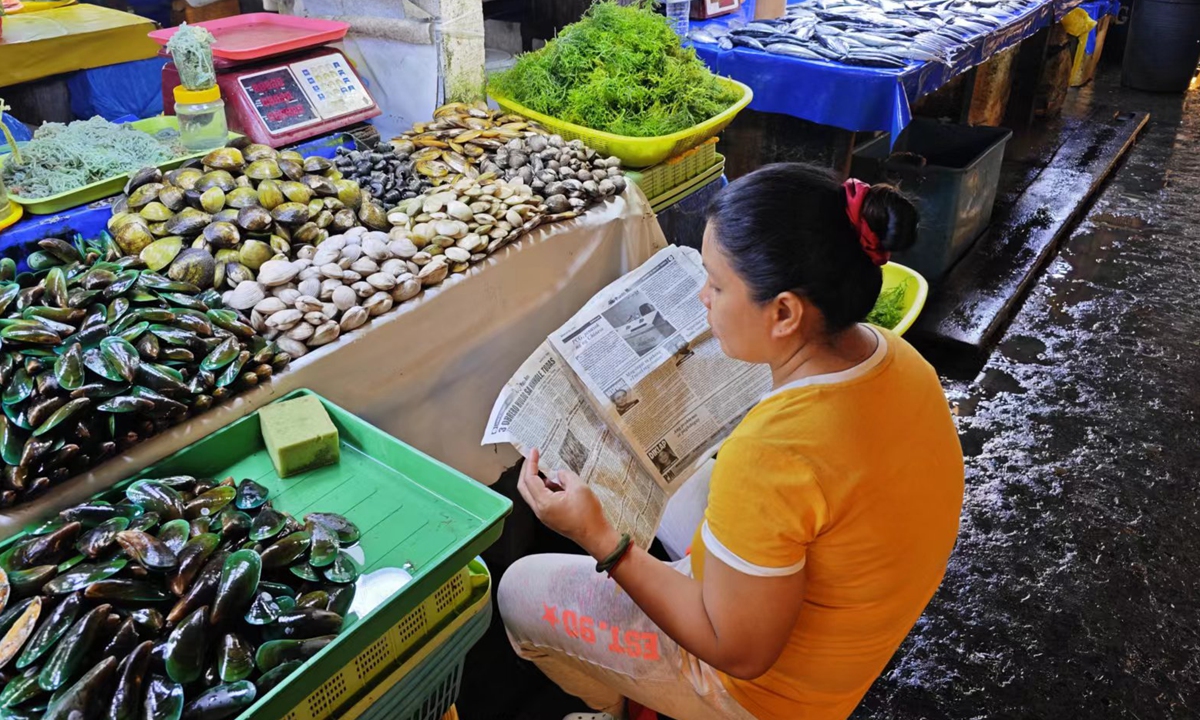
A seafood merchant in Davao, Philippines, reads a newspaper about Philippine Coast Guard operations in the South China Sea on March 25, 2024. Photo: Hu Yuwei/Global Times
“The issue in the South China Sea is only found in papers in the Philippines that are dominated by Western narratives. But if you go around the country, you’ll see that the ordinary people care more about peace. They don’t want war. They care more about fighting inflation and economic hardship. They care more about making commodities more affordable to them. They care more about having jobs. They care more about having good transportation. We need trains, we need roads, we need bridges that China can provide, and we need more trade with China. It’s a pity that many of the narratives in the media are controlled by this Western narrative of anti-China sentiment,” said Banlaoi.
When then Philippine president Rodrigo Duterte visited China in 2016, the two sides discussed fishery cooperation in the South China Sea, including bilateral cooperation in the fishing industry, and it was then that China agreed to make proper, specific arrangements given its friendly relations with the Philippines.
Chinese officials from the Ministry of Agriculture and Rural Affairs’ Bureau of Fisheries also visited Masinloc town in November 2016 to learn about what assistance they could provide to local fishermen. The following year saw a delegation of 17 Filipino fisheries representatives, some from Masinloc, who were invited to South China’s Shenzhen, to participate in training organized by the Chinese Ministry of Agriculture, bringing back China’s most advanced aquaculture technology to Manila. Experts said at the session that if China’s deep-sea net cage aquaculture technology could be promoted in the Philippines, the income of local fishermen could increase several times or even tens of times over.
However, it is regrettable that today, when we set foot in Masinloc again, what is reported in the media is overwhelming about the territorial dispute, and the well intentioned and mutually beneficial fisheries cooperation seems to have disappeared from sight.
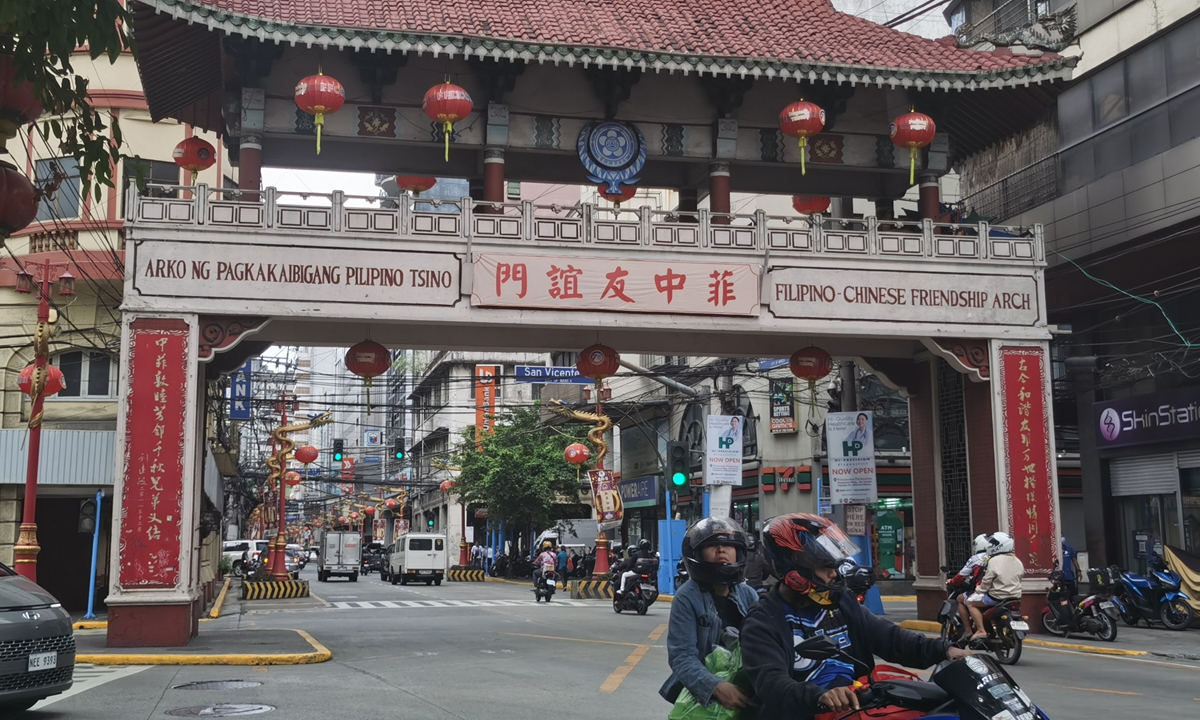
The Filipino-Chinese Friendship Arch in Manila that marks the lasting friendship between two countries Photo: Hu Yuwei/Global Times
“The Filipino people have high expectations for peace and cooperation between the two countries, but their voices are marginalized, as part of the result of Philippines’ cognitive war against China,” Ding Duo, deputy director at the Research Center for Ocean Law and Policy at the National Institute for South China Sea Studies, told the Global Times.
“The current government is trying to divert public attention from various domestic contradictions caused by its ineffective governance through creating an external enemy, China. The government misleads the public domestically and plays the victim externally, which is not conducive to the resolution of the South China Sea issue,” the expert warned.
“We should not make the South China Sea issue deeply entangle China-Philippines relations,” said Ding.
During the short visit to the Philippines, Global Times reporters often saw headlines in the local newspapers reading “We will not be cowed into silence – Marcos,” and vendors in the fish markets reading newspaper claiming “China wants to occupy Huangyan Dao.” However, the most common phrase the reporters heard wherever they went was “we are not enemies” – from officials and ordinary people on the streets, to fishermen.
Who benefits from changing the status quo by fanning the flame in the South China Sea? Perhaps the Philippine government should find some answers from the voices of their people.
